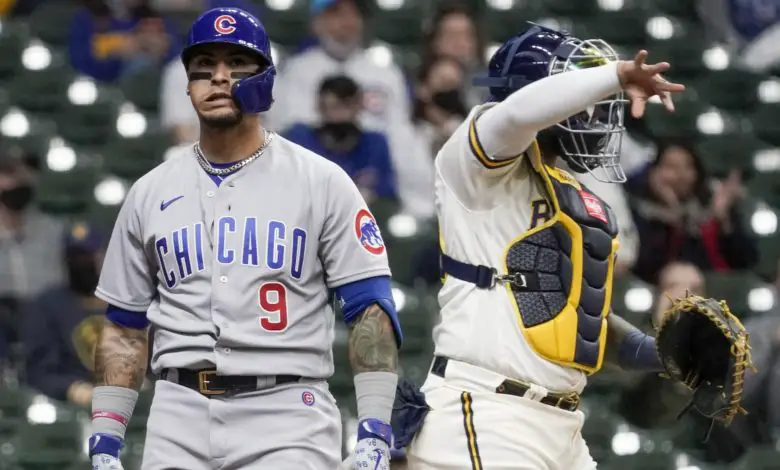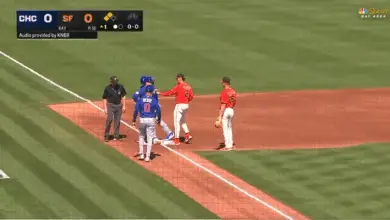
Best-Selling Book on Cubs Hitters Far Too Easy for Opposing Pitchers to Read
While not even the Cubs’ most ardent skeptics could have predicted the offense would be this bad in 2021, it’s been obvious for years now that something is wrong. When Brandon Morrow joined the team prior to the 2018 season, he tried to help by explaining how the Dodgers knew to attack them with high fastballs in the previous NLCS. Four years later, pitchers are still doing the same thing.
The book on the Cubs, which reads like either horror or comedy depending on your viewpoint, reached best-seller status in part because it’s so easy to read. Like an early Stephen King title, it’s relatively short and features seemingly ordinary pitchers producing almost supernatural results.
“Throw them up and in and then down and away,” an opposing pitcher told ESPN’s Jesse Rogers. “That’s what you do with any hitter, but especially the Cubs.”
As dangerous as it should be to have a blanket strategy for an entire lineup, it’s difficult to mount a counter-argument here. There simply isn’t a great deal of variation in the approaches of the different hitters up and down the order, which makes a pitcher’s job pretty easy.
“They’re down-ball hitters,” another pitcher said. “All of them. Just don’t throw a mistake down there. Even David Bote, who’s relatively new, likes it there.”
Bote certainly does like the low fastballs, something you’ve heard quite often if you listen to Ron Coomer on the radio call. The utilityman likes the low stuff so much, in fact, that he had never recorded a hit against a high fastball of 97 mph or more prior to Saturday. Seems like more than just a fluke.
With his double against a 99mph fastball Saturday, David Bote recorded his first *career* extra base hit against a >97mph fastball up in the zone pic.twitter.com/74KMNqVjxq
— Brendan Miller (@brendan_cubs) April 19, 2021
I want to quickly point out a fallacy in the belief expressed above before we continue, particularly in light of the persistent belief that Kris Bryant can be handcuffed by inside stuff. While that was certainly true in 2020, when he played most of the season with an impact fracture in his left wrist, the third baseman has historically done really well against pitches up in the zone and inside.

Okay, so everyone knows how to beat the Cubs and now they’re actually talking about it. The Cubs themselves know this is going on as well, which begs the question: Why in the blue hell have they been utterly powerless to reverse course?
“It’s almost mind-boggling,” an AL Central scout told Rogers. “There’s too much talent on that whole damn Cubs team. No one can figure it out. I’ve talked to a bunch of guys [other scouts].”
It’s not a matter of bat speed or athleticism, so the issue isn’t physical in nature. That means it has to be at least partly a matter of scouting and preparing for individual pitchers and teams, something I’ve harped on for a while now. One specific case is Tyler Mahle and the Reds, who seemingly had the Cubs’ number last season, though there appears to be a much more general failure to adjust to their opponents.
“They should be able to catch up to fastballs, and for some reason they are not,” Rogers was told by an NL East scout. “Are they using analytic tendencies too much? So, in a game they expect one thing but the opposition is doing something else?”
This is an organizational issue in every sense, as the Cubs stockpiled and developed a certain type of hitter in order to find rapid success at a time when other teams were leaning on pitching. It worked for them in the best possible way, but it’s become more evident with each passing season that their collective approach had a limited shelf life.
The front office failed to recognize and correct for flaws in their evaluation and development strategies for far too long, but the players haven’t done a great job of changing their own way. It’s also about a coaching staff that didn’t properly address issues from advance scouting to targeting hitters’ troubling tendencies. As just one example, Ian Happ had to go down to the minors for nearly a full season in order to identify and fix swing problems that had been allowed to fester for far too long in Chicago.
“They’re trying to change their philosophy, but with this core group, they had one philosophy and all these guys bought into it,” Rogers was told by a scout. “It’s turned into a one-dimensional offense. There’s something to be said about contact and putting the ball in play.”
Nothing about this is as simple as most conversations mandate we make it, though the end result is that the Cubs have become a simple team to scheme for. And as much as their abysmal start speaks to an inevitable rebound of some sort, the looming matchup with Jacob deGrom and the Mets doesn’t figure to provide a springboard.
But hey, maybe we’re all in for a big surprise.

